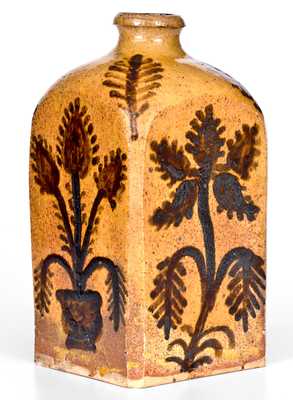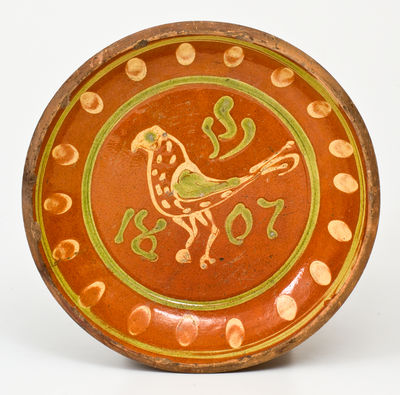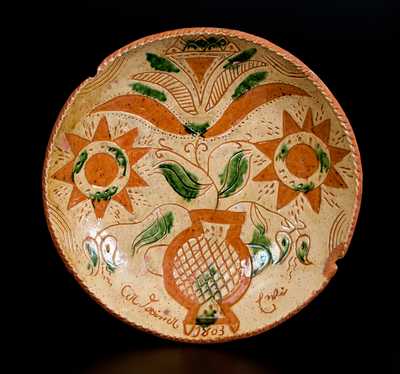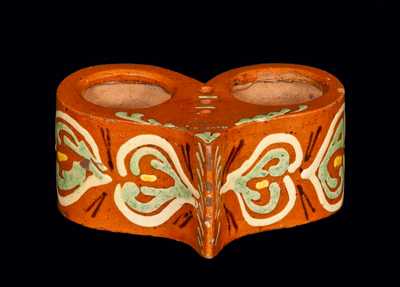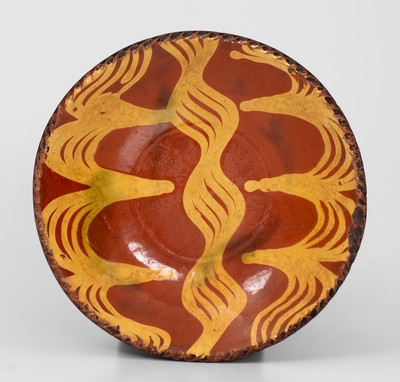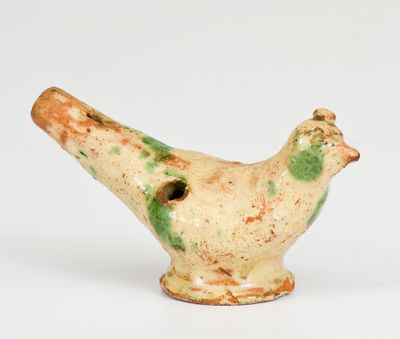Highly Important Slip-Decorated Redware Abolitionist Charger, Inscribed "Remember him that is in bonds," Philadelphia, PA origin, early 19th century, with coggled edge, the lead-glazed interior decorated with the inscription, "Remember / him that is / in bonds," in yellow-slip script, bordered by wavy trails of yellow slip. This dish is the only example of 19th century American redware that we have seen with a direct reference to the anti-slavery movement. Its inscription is derived from Hebrews 13:3: "Remember them that are in bonds, as bound with them; and them which suffer adversity, as being yourselves also in the body." Variants of this slogan and references to Hebrews 13:3 can be found on a number of English anti-slavery pieces produced by or inspired by Josiah Wedgwood (1730-1795) that include the image of a kneeling enslaved person in chains. Wedgwood was the first to use the iconic image in his pottery's work, along with the inscription, "Am I Not a Man and a Brother?" In 1788, he gifted a number of cameos bearing this second inscription to Benjamin Franklin, president of the Pennsylvania Society for Promoting the Abolition of Slavery and for the Relief of Free Negroes Unlawfully Held in Bondage, (also known as the Pennsylvania Abolition Society.) The society, the first of its kind in America, was founded in 1775 in Philadelphia, the same city as this dish's manufacture, a fact evidenced by the piece's wide edge coggling and serpentine slip lines. The charger may have been made for the Pennsylvania Abolition Society or as a general expression of the strong anti-slavery sentiment in the city as a whole. Its importance is compounded by the paucity of surviving slip-inscribed pieces known from this prolific potting city. Though popular in areas further north, primarily Norwalk, CT, few slip-script pieces from Philadelphia are known. Given this charger's subject matter and high decorative appeal, we consider it among the most important examples of American redware that we have ever offered. The Brooklyn Museum's famous Thomas Oakes (New York) redware punch bowl, inscribed "Freedom to the Slave" and dated 1792, is the only other example of abolition-themed American redware of which we are aware. Literature: Illustrated and discussed in Miller, "Norwalk (Connecticut) Slip-Script Potters, the Pottery, and Related Wares," Ceramics in America 2016. Provenance: Ex-Sotheby's; from a recently-surfaced CA collection. Very nice condition with an old 1 1/2" flake to edge, a few other minor edge chips, and surface wear to center of interior. Remarkably, no glaze loss to interior. Dimensions: 13 3/4" x 2 3/4".








